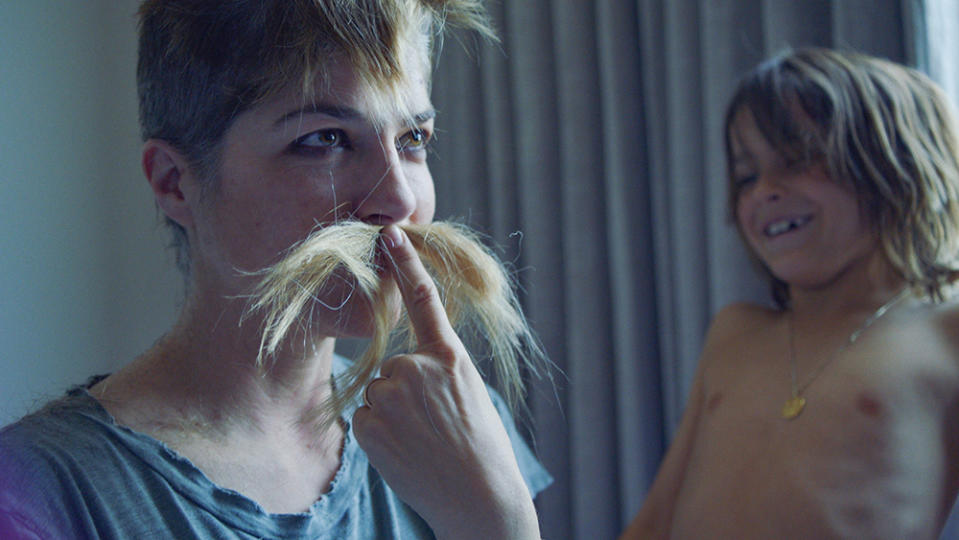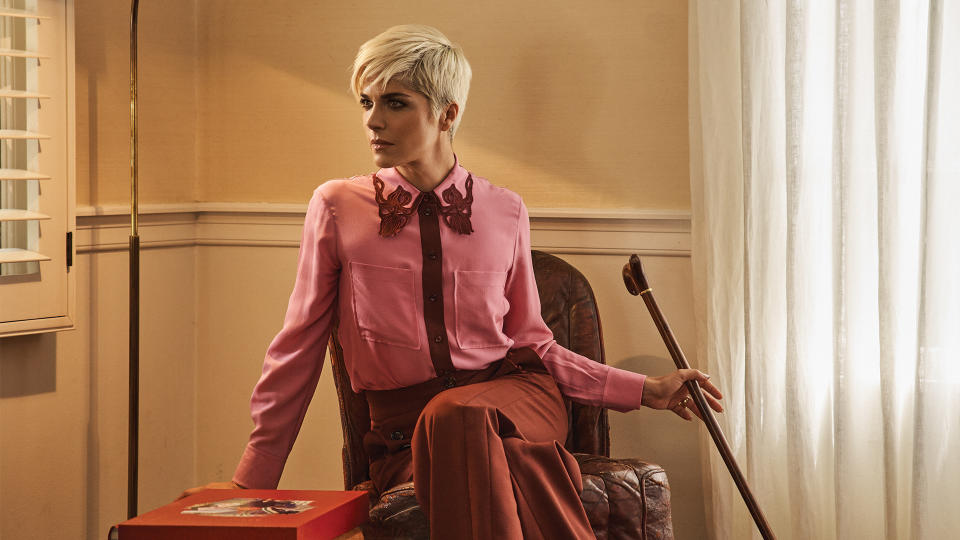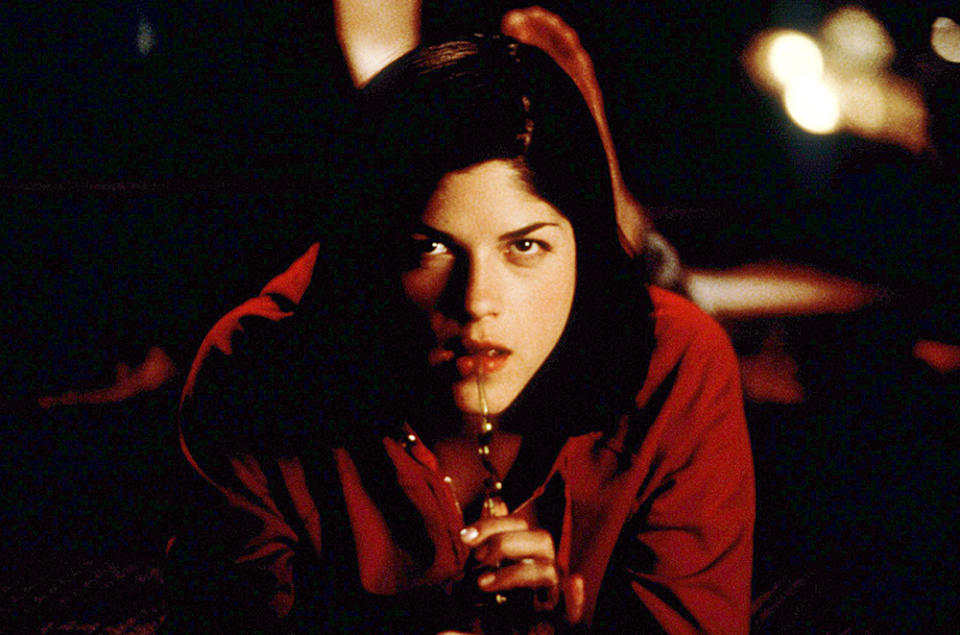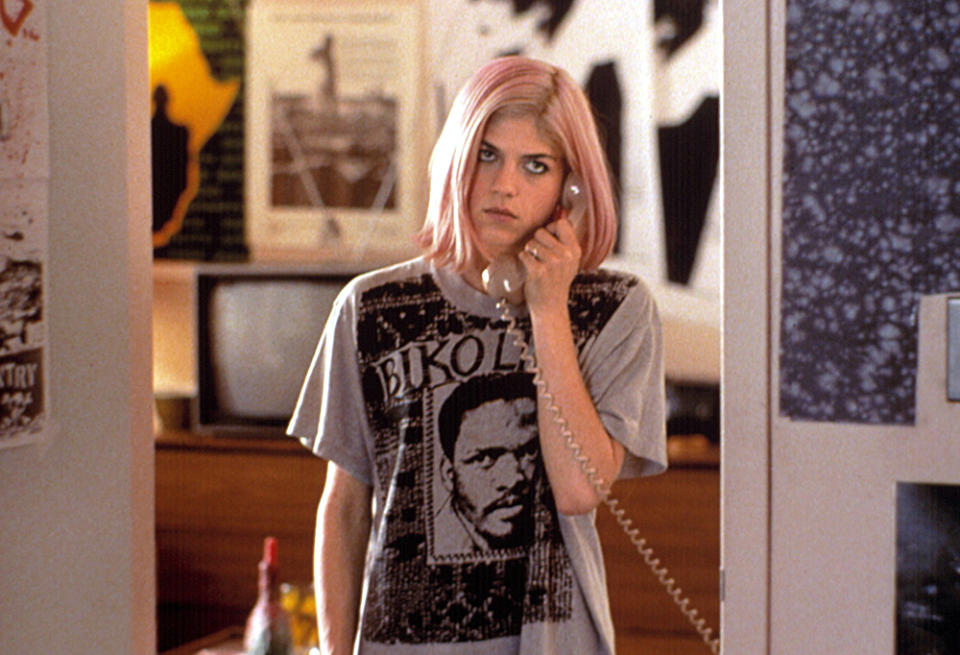Selma Blair on Living With MS, Loving ‘Cruel Intentions’ and the #MeToo Movement: ‘It Just Set Me Free’

The film “Introducing, Selma Blair” documents the 2019 stem cell transplant Blair underwent in order to heal her multiple sclerosis — and though the two-month-long medical process is harrowing, the movie both illuminates and entertains. As captured by first-time feature director Rachel Fleit, Blair is an open book; she’s charming, vulnerable, insightful and hilarious.
During an interview with Variety at her Los Angeles home in late August, Blair was much the same, and detailed the mysterious symptoms — undiagnosed until Aug. 2018, when she was 46 — that have plagued her for her whole life, as well as her decision to be the subject of a documentary. After a limited theatrical release, “Introducing, Selma Blair” is now available to stream on Discovery Plus.
More from Variety
A Candid, Vulnerable Selma Blair Explains Why She Invited Cameras to Document Her MS Journey
Selma Blair on MS Remission and Inviting Documentary Cameras to Film Her Treatments
'I May Destroy You,' 'Crip Camp' Among Next Batch of 2021 Peabody Award Winners
In the interview, Blair talked extensively about her late mother, who died in May 2020, and who emerges as a character in the movie through Blair’s anecdotes about her, often accompanied by her vivid imitation. (Blair speaks on the phone with her mother once in the film.)
Blair delved into her career as well, and how she “loved” being in “Cruel Intentions” — but that her mother’s favorite of performance of hers was in Todd Solondz’s 2002 film, “Storytelling.”
And Blair discussed how she felt set free after coming forward with her allegation that director James Toback had sexually assaulted her in the late 1990s. Blair first spoke anonymously in an Oct. 2017 Los Angeles Times story that featured dozens of women accusing Toback of sexual harassment and assault; then a few days later she spoke by name in a first-person account published by Vanity Fair. (The L.A. Times reported in Jan. 2018 that 395 women had ultimately contacted the paper with sexual harassment and assault allegations against Toback.)
When contacted by phone and over text, Toback denied Blair’s allegations and declined to comment further. Despite repeated attempts on Toback’s part to contact Variety for unrelated reasons, he did not offer further comment on the record.
Early in the #MeToo reckoning a few years ago, you were tweeting hints about things, and you and I DM’d. But we’ve never talked or met until today.
I was fishing for other people. Truly, it’s unbelievable looking back now how much it had a hold on me. It was in every thought. Glenn Whipp had agreed to just listen, and just not put me in.
That was the beginning of a new era for people.
It really was.
People were ready to be able to let go of their secrets.
The L.A. Times and Vanity Fair stories about James Toback — those were earlier than I remembered: like, in October 2017.
I remember being so nervous, because I was still afraid of the predator. I was still under his threats. And now I realize once you turn on the light, you’re like — it set you free. It just set me free. And when he said such horrible things in Rolling Stone, when the interviewer’s own wife was a victim of Toback, and Toback didn’t know.
And when he says all they’re all cunts and liars, then I was like, “Oh, I’ll talk. I can’t let these women just be called liars. Like, their stories are exactly the same.” I had no idea the floodgates it would open, and really a huge beginning of an era as we see so much change. I was really genuinely afraid for years.
Why did you not talk about James Toback in the movie?
Because it was already covered. And this was just a different thing, and I have moved past it.
And how are you doing today?
I am in a lot of pain; I am well. I said I was in remission, and I want to give that its due for the stem cell transplant, because nothing was taking down the flare. It absolutely put me in remission, which means no new lesions have formed since my HSCT.
You go into it thinking, “Oh, it’s going to be a cure.” But what is cure? It did what he said. It’s just a period of acceptance that I’m changed. And that’s fine; I’m lucky. It’s softened my edges, and the neurological damage I have, it’s been a gift because it’s really softened me and created a lot more compassion for myself and others. Which is always useful.

Courtesy of Discovery Plus
You say in the movie that your symptoms got much worse after your son Arthur was born. What was happening then?
It’s interesting, I was chronically a miserable person in my life, I must admit.
Ha!
No, it’s true! I was chronically a miserable person. I was a loving person, but yeah: miserable, a bit sharp, a bit snarky, a bit angry that I had to get up and do things when I just chronically felt unwell. I wasn’t looking for a hand out, but it fucking gets you really unnerved as you try and keep up. And I’d compare myself to people, like, “What?” I didn’t understand people didn’t hurt every day. I’ve hurt since I can remember.
Really?
I’m not asking for a handout, but if I could have acknowledged that there was something real — a label that people understood — it would have just helped me emotionally. Because I really couldn’t understand: “I need to sleep all day.”
But then I got pregnant, and I felt amazing. All my lifelong symptoms went away. I even wrote in journals, “Oh my God, this might be why my mom got pregnant four times.” She didn’t really love kids or babies or any of that, and I certainly don’t. I’m not a baby person. I never had any intention of getting pregnant. But when I did, I was like, “Oh, this is what my mom was talking about. I don’t have depression. I don’t have the same pain. I have energy.” I felt amazing. Happy! I wore pink. I stopped being such a New York Jew. I was like, “I see what these people are talking about. I have a hustle in me.” I felt amazing!
Then I had a horrible labor. Finally, at 37 hours, when I had an epidural because I couldn’t take it anymore, and my friend said, “Stop trying to be such a midwife, lady.” So, I got like five epidurals until I could finally relax enough, but it would never take on my full body. By the time I did give birth, the pain set in. I couldn’t move. I really couldn’t move. I was not paralyzed. The pain was so intense in every joint, in my hip, everything.
And the cranial sacral people, they said, “No, this is what mothers have.” So, I just said, “OK, buck up. This is what mothers do.” The nerve pain and everything just continued for months — for years! I’d just fall. I’d pass out. Things would happen, and I just had so much self-hatred. How am I such a weak, lazy-ass that I can’t handle what every mother does?
My self-hatred was off the charts. I have thyroid eye disease, I didn’t know. I was putting my breast milk in my eyes, they were so red, for three years. My vision had gone, and I just thought, “Wow, my postpartum is intense.”
My God.
I thanked God every day in my gratitude group, but I was getting weaker. My riding instructor, she would say, “OK, left leg, let’s get it!” I have a history of knowing how to ride as a good amateur rider, but I was like, “God, is this aging? I don’t have a left side!” I just figured this is age and nerve damage. I didn’t acknowledge that I was really in an MS flare for many years, and I was getting debilitatingly worse.
I thought, “Oh, I’m a head case.” When I moved to L.A., I remember going to a doctor for it, and he didn’t give me an MRI, didn’t give me anything, but looked at me and was like, “Are you just wanting pain meds?” Because I was like, “Librium helped the last time.” I’ve never been addicted to pain meds, never wanted it, but just even asking for Librium, he just assumed I was looking for drugs. Every avenue I turned my whole life, almost, except for one eye doctor at 23 said, “Has anyone told you you have MS?”
When you were 23?
At 23, after a very big medical issue. When I had gotten out of the hospital for something else, it had already gone back. But the vision damage had lasted. There was no Google then. I’m the opposite of a hypochondriac, because I convinced myself everything was in my head. So, if I had real physical symptoms, I dismissed them as, “I’m just highly sensitive, and I’ll have to work through that.” My father did take it seriously, but I didn’t. But we find things when we find them.

Brian Bowen Smith for Variety
I imagine you’re constantly being told you don’t have MS — that you have something else. When Christina Applegate came out about her MS diagnosis, I was looking at responses to her tweet, and someone was like, “Have you considered that it might be Lyme disease?”
I get that still every second of my day. I didn’t read any of the responses to dear Christina, who’s a dear friend of mine. But I did read some of mine — yes, I was checked for Lyme disease. Everyone has such a say in the diagnosis. But the Lyme thing is so huge; Lyme is debilitating too. Either way, there’s neuropathy, and maybe it’s people being helpful, but it is funny.
I don’t think it’s helpful.
I don’t think it’s really helpful either. She said what she wants to say. She just wanted to say that to let you know where she is in her life.
Even with me, it was debilitating for me emotionally. When people would say, “Oh, no cane day?” Some days I wear my braces, some days I don’t. It depends where I have to go. I don’t need to apologize for it. I don’t need to justify to people. But I’m perfectly willing to explain. I am. I’m a talkie. I’m fine being a bridge for people with some chronic thing or a neurological difference. But, yeah, it is unnerving. Bossy fucking people!
Oh, did I sound angry and bitter? I’m not. I’m just a loudmouth.
I get it. The thing that you say in the movie about just being grateful and wanting to just face every day — that’s obviously something that people say. But having had cancer, in annoying moments, like with one of my sons or whatever, I do say to myself, “At least you’re not dead!”
When I get angry, I’m like, “You asked to be here!” Because as I was saying, I was a miserable person before. And when I took those stem cells and people went to such efforts to help me, the nurses, the hospital — that was my wake-up call. That was my kind of rebirth to say, “You might have not been happy about living before. Because you were miserable. But you’re making this choice, and let’s remember this: You’re making this choice right now.”
You made it, you’re here. This is a gratitude thing, and it doesn’t mean you’re going to always be comfortable.
How did you get to know Carrie Fisher?
We were at a women in Hollywood lunch, maybe 2002 or something. And she just came up to me in her way, with Bruce Wagner. “I’m having a party! You’re so cute! Come, it’s my birthday! You’re sober, I’m sober.” And she was just a breath of fresh air, because I had hung out with everyone younger — I’m much older than people thought I was. And because I came into this business playing a child, playing 14 as Cecile Caldwell at the age of 26 — and having already gone to university and considered medical school and being kind of miserable all my life — I was already kind of a worn-down, old Jewish soul. And acting like a WASP, and all these things.
Of course, I always knew of Carrie, but having someone more my generation reach out, because everyone I was hanging out with was 15. And I was really trying to keep up with the Joneses, you know, these superstar young people. And I was just like, “Oh my God, I’m saved.” She’s just so much like my family at home. And she latched onto me, and changed me in the way that she could talk about with humor about her condition of misery. And bring such joy and familiarity to it.

Columbia/Courtesy Everett Collection
Your mother died early in COVID, right?
May 23. Early.
What did you want the movie’s audience to know about your mother?
So tricky, because she’s such a private person. You know, she became a judge so that people couldn’t mess with her credibility. She’d been messed with in her life. And she’s my person, I love her so much. Of course she left in COVID. It was so painful.
My mother, she had cancer and didn’t know. She wouldn’t go to a doctor. You know, she was so proud. And mistrusting of doctors, for good reason. And so it was hard to even show in the movie that little bit talking on the phone, because her brain was going. And she would have been horrified to have been revealed to not be on her game.
There was no message in it, other than I was a person that still wanted her mom. When she did die so suddenly — I mean, I don’t know if she died of COVID, I don’t know if she died of the cancer, which was going to get her in months anyhow. She didn’t have Alzheimer’s. She didn’t have dementia. She did not have a pickled brain. She enjoyed her cocktails. And that was a fear, like oh mom’s just pickled.
But she wasn’t, it was cancer and she was brave and wonderful. Like so many people, I couldn’t be there to make her beautiful for when the coroner came. That was my greatest feeling of failure as a daughter. To protect her from any judgment.
She was home?
She was home, she wasn’t feeling well, and she was coughing. She took a nap. Her caretakers called my sister Mimi and said, “I think your mom is gone.” Yeah, it’s a grief for me.
You seem to have a huge support system here. Does it feel that way?
It does. I’m a loner though. My God, those busy people, like Reese, stood up to get me meals. That’s where group stuff works so amazingly, like to take little bits of load off for the village to do. Sarah Michelle Gellar and Jaime King, with her heart and her time and appointments.
I hated having caregivers in my house. I want to be alone, like my mother. But my God, did they help me — and for Arthur to see people rallying around his mother, who is a loner. People can show you goodness.
You were so central to the late 90s, early 2000s teen boom, when you were in your solid mid-twenties. What was that time like?
I loved it. I couldn’t believe it. I couldn’t believe I was in a film with Reese Witherspoon and Sarah Michelle Gellar. “Cruel Intentions”? That was a coming out party. I always wanted to be a debutante, buy into all the fun, and I was like, “I’m just a fan.” I mean, I’m not trying to — because I was older, but without career success, without a history, a pedigree in Hollywood, but because I was so excited, it helped me feel just young.
It just all felt natural. I have good stories in Hollywood. I have things that I wish I probably did differently. I have a very different perspective now. No, I loved it. I loved it! I embraced it.
I mean, even the movies that I did that were shlock, that I was even terrible in — I realized I really need people to elevate me. I’m not going to play the girl next door; I’m going to suck. I need to grab onto something more tangible and maybe off-putting. I didn’t have access to people that weren’t uncomfortable. I didn’t even know it in my skin. So to play Cecile as this bumbling — it’s just great for me to play a bubbly person in that, and take someone who was a victim and make it bearable with her kind of ridiculous optimism until she woke up.
The way you talk about your career in the movie, it’s not self-deprecating or false modesty for the sake of it —
It’s not. I’m being honest!
It’s very clear-eyed.
I did more than I ever thought! My God, I’d be thrilled if I came here and booked a commercial for Wrigley’s Double Mint. I would have been like, I’m the shit! I’m in a fucking Wrigley’s commercial! Now, I might’ve undervalued myself, as I see myself now, but I wasn’t myself then.
All I could give is what I could give. And I was always asking, “Is there a part for a corpse?” Like, that’s what I felt I could play. I had so little energy that I’m shocked I even got through what I did. I’m fucking amazing. And I loved being a supporting actress. I loved witnessing it. I went to college for English, psychology, pre-med, music. I can’t even carry a note. I didn’t know what the fuck I was going to do. I’m so grateful I had a roof over my head. My mother definitely taught me humility. And she was the most critical son of a bitch, but I mean, she was the first to say, “Crap — that was horrible, that movie.” But then, “Oh, Selma, such presence in that.”

©New Line Cinema/Courtesy Everett Collection
What movies did your mom think you were good in?
Oh, “Storytelling,” she loved. And she could not stop saying, “Fuck me [mmm] Fuck me [mmm].” She just thought, “Ah!” It woke her up. And she loved Todd Solondz — “Happiness” is her ideal. Pitch perfect. Howard Stern would play in the background before things got so politically correct, and that he would play that outtake of me saying, “Fuck me” to this Black teacher, things that we don’t —. To me, that wasn’t racist at all. Todd was making a commentary. He’s ahead of his time.
I rewatched “Storytelling” to prepare for this.
I think it’s incredible. I love it. I mean, it’s the least offensive movie of his, because he’s so understanding. And my mother got that. And when I’d get to say his lines: “Oh, Selma, that was lovely!”
She did enjoy “Cruel Intentions,” but mostly it was like, “I don’t know what you’re saying, mumbling.” But it was true. “I needed the money, Mom,” or, “That was with Meg Ryan. I loved watching her.” I don’t elevate a lot of things, but if someone is elevated, I’ll meet them, and I’m thrilled and I’m just right. And that is knowing your strengths, and not getting too down. I am plenty proud of a lot of things, but, no, my mother — she was right.
She’d be furious that I dressed like this for you. She’d say, “This is a movie star? This is your coming out party, and you can see half your ass cheek?”
And she would have lit a cigarette, asked for a drink at the end, eaten it with her credit card, not realizing it wasn’t a cracker. But she was still a force. I’m still intimidated by my mother. And she wanted me to intimidate people, because she knew that was how you kept safe. I’m not going to intimidate anybody.
But to know the rules is to break the rules, as my mother said. So, in that, I’m free.
This interview has been edited and condensed. Variety’s magazine story about Selma Blair is here.
Best of Variety
The Best Pop Culture Halloween Costumes for 2021: From 'Squid Game' to ' Lil Nas X
Best-Selling Celebrity Memoirs: Billy Porter Joins the Ranks
Sign up for Variety’s Newsletter. For the latest news, follow us on Facebook, Twitter, and Instagram.

 Yahoo Finance
Yahoo Finance 